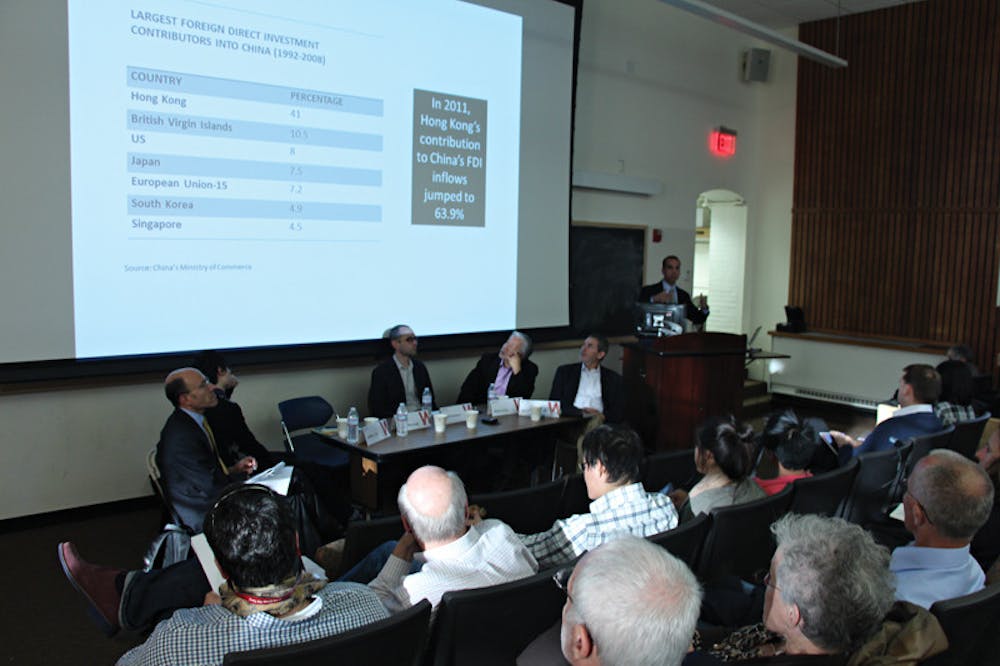Five panelists and a large audience wrestled with the complex issues surrounding the recent protests in Hong Kong at a Watson Institute for International Studies-sponsored teach-in Monday.
The event, “The Future of Democracy in Hong Kong,” focused on the historical roots, conflicting ideologies and uncertain future of the “Umbrella Revolution,” the current uprising that has captured the world’s attention as it reaches its third week. The protest pivots around the Chinese policy of controlling which candidates are allowed to run for Hong Kong’s chief executive office.
Some of the panelists at the event expressed solidarity with the movement. Richard Boucher, a senior fellow at the Watson Institute, and Jeffrey Ngo, a Hong Kong native and student at New York University, discussed how they see the protest’s aims as legitimate and correct.
Boucher — who served as a diplomat in Hong Kong from 1996 to 1999, the period during which China regained the territory from the British — stressed the uniqueness of Hong Kong’s people and culture, which he said could be lost by China hand-picking the candidates that can run. “That sounds like Iranian democracy,” he said.
Ngo, who has friends participating in the protests, highlighted the nonviolent and creative aspects of the movement. The protesters sit down, they sing songs, and it’s really difficult to see (a protest) anywhere in the world without broken glass and a burning bus. I’m very proud of that,” he said. Ngo displayed an image of protestors parting to let an ambulance through and the protesters’ signs used to indicate services available at the protest sites.
Other panelists, while similarly sympathetic to the nonviolent nature of the protests, indicated skepticism of the movement and its potential success.
Eli Friedman, a professor at the Cornell School of Industrial and Labor Relations, discussed the unrealistic nature of the protest’s goals. He began his remarks by investigating the history of modern China, how the nation has been shaped by imperialism and why that reality would make it difficult for China to accept a more autonomous Hong Kong.
He cited the Chinese government’s “fundamental belief that China consists of almost all the territory that was controlled by the Qing dynasty … including Tibet, Xinjiang, Taiwan, Hong Kong, etc” as a central tenet of Communist ideology. This idea arose from colonization and disintegration of the Chinese state early in the 20th century.
He argued that any inkling of democracy or further autonomy in Hong Kong “raises the specter of the domino effect,” perhaps destabilizing Tibet or Xinjiang and jeopardizing the unity of China that Beijing treasures.
David Rezvani, a visiting professor at Dartmouth College, discussed how media coverage of the protests can be misleading, arguing that the news media has perpetrated misconceptions surrounding the protest movement. China cannot take measures to crack down against Hong Kong because of the latter’s pivotal role in China’s economy, he said, adding that Hong Kong is China’s largest source of foreign direct investment and that “there would be a panic” if any aggressive military action were taken.
Rezvani added that the media’s portrayal of the situation as a dispute between a group of pro-democracy citizens and Beijing is misleading. Instead, he said the dispute was between those citizens and the Hong Kong business community, which abhors the concept of an internal democracy. Democracy would expand welfare and regulations, hampering Hong Kong’s relatively unfettered capitalism, he added.
Robert Lee, an associate professor of American Studies, expanded on Rezvani’s points. The power of the business elite, Lee said, has created a suite of issues in Hong Kong that extend beyond a mere lack of democracy. As an example, he discussed how Indonesian and Philippino female migrant workers, who work under what he called terrible conditions, have primarily spearheaded the “unheralded and invisible Occupy movement.”
Hong Kong has the greatest wealth inequality of any developed country and a huge housing crisis, Lee said, adding that the protests “mask a deep set of social fissures.” Ethnic tensions between Cantonese and Mandarin speakers may pose more of a barrier to improvement than the absence of democracy, he added.
Student input reflected a variety of views. During the follow-up question-and-answer session, one student compared the current protests and the 1989 ones in Tiananmen Square, saying that the critical difference between them is that the majority of people on the mainland do not sympathize with the movement in Hong Kong.
Another student questioned the attitudes of the protesters. The threat of staying in squares until all their needs are met “resembles us whining to our parents when we were little,” he said.
Ngo responded, saying that the student’s claim undermines the seriousness of the issue. “What they’re calling for is legitimate,” he said.
Audience reactions following the teach-in also demonstrated varying opinions. Jeron Impreso ’17 echoed Friedman’s thoughts on China’s opposition to the protesters’ calls. “If China decides to go along with ‘one country, two systems,’ and Hong Kong decides to become more autonomous, this conflicts with the idea of a united China,” he said.
Lynn Ha ’17 also expressed concerns about full-scale implementation of Western-style democracy, though she approached the issue from the perspective of Hong Kong, rather than that of China. “It’s important to know that there’s a variety of systems out there, and you can’t just say, ‘democracy is the one for Hong Kong,’” she said.

ADVERTISEMENT




